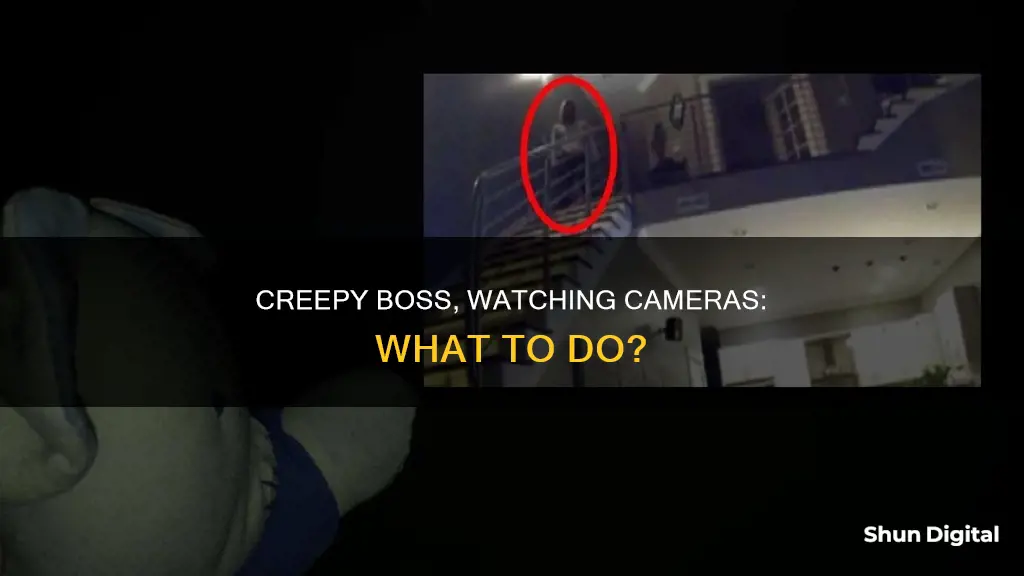
The use of surveillance in the workplace is a contentious issue. While it is generally accepted that employers have the right to monitor their employees, the extent to which this is done can be seen as invasive and creepy. Some employees have reported feeling uncomfortable and spied on when their bosses watch them constantly on security cameras, even during their days off. This can create a toxic work environment and lead to high staff turnover. In some cases, employees have resorted to quitting their jobs to escape the constant surveillance. While employers may have legitimate reasons for monitoring, such as ensuring productivity and preventing theft, it is important to consider the impact on the well-being and privacy of employees.
| Characteristics | Values |
|---|---|
| Constant Surveillance | Watching employees' every move, even on days off |
| Lack of Trust | Inherent distrust of employees |
| Micro-management | Monitoring employees' productivity and efficiency |
| Invasion of Privacy | Spying on employees without their consent |
| Lack of Communication | Not disclosing the presence of cameras or the reason for monitoring |
| Unfair Treatment | Singling out specific employees for surveillance |
| Inappropriate Behaviour | Admitting to watching employees with pride and no shame |
| Toxic Work Environment | Creating a hostile and uncomfortable work environment |
| Lack of Respect | Treating employees like prisoners and controlling their every move |
| Power Trip | Abusing power and position to satisfy their ego |
| Lack of Boundaries | Watching employees during their breaks and outside of work hours |
What You'll Learn

The legality of workplace surveillance
Workplace surveillance is a controversial topic that raises ethical questions about the state of public surveillance regulations and the abuse of personal rights. While employers implement surveillance policies with the best interests of their staff and organisation in mind, employees prioritise their privacy.
In the US, there is no comprehensive federal law regulating the extent to which employers can monitor employees in the workplace. However, there are some federal laws relevant to specific workplace surveillance situations. For example, federal wiretap laws prohibit employers from monitoring or recording employee communications, which may restrict the use of audio in video surveillance. Additionally, Section 7 of the National Labor Relations Act (NLRA) prohibits the use of surveillance cameras to monitor union meetings or activities.
Workplace surveillance laws vary by state, and several states have laws explicitly addressing video surveillance. For instance, California, Connecticut, Delaware, and New York prohibit video or audio surveillance in certain areas, such as restrooms or break rooms. Some states, like Connecticut, require employers to notify employees of any camera usage in the workplace.
In the absence of specific state laws, courts weigh two critical factors to determine if video surveillance is justified:
- Employees' Reasonable Expectation of Privacy: Courts consider whether employees had a reasonable expectation of privacy in certain areas or situations. For example, while there is no expectation of privacy in public workplace areas like lobbies, surveillance in locker rooms or employee lounges would be considered off-limits.
- Legitimate Business Purpose: Courts also evaluate whether the employer had a legitimate reason for surveilling employees, such as monitoring productivity or preventing internal theft.
The balance between these two factors helps determine if an employee's privacy was invaded.
It's worth noting that the use of employee monitoring technologies has become more prevalent with the growth of digital technology. This includes video surveillance, employee monitoring software, time and attendance software, GPS systems, and biometric technology. While these tools can improve security and productivity, they also raise concerns about employee privacy and trust.
To ensure legal compliance and maintain a positive workplace culture, employers should communicate the purpose of employee monitoring transparently and be mindful of the potential impact on employee morale and productivity.
Stream Tybee Island: Accessing the Tybee Cameras
You may want to see also

The ethics of monitoring employees
Employee monitoring is a common practice in many organizations, and while it can have positive outcomes, it also raises ethical concerns. The ethics of employee monitoring revolves around the tension between an individual's right to privacy and an organization's need to ensure productivity, protect critical assets, and mitigate insider threats.
The Case for Monitoring
Organizations may argue that monitoring is necessary to:
- Improve productivity by reducing workplace distractions
- Prevent internal theft and data breaches
- Ensure company resources are being used appropriately
- Provide evidence for potential litigation
The Case Against Monitoring
However, employee monitoring can also have negative consequences and ethical implications:
- It creates a culture of distrust and invades employees' privacy.
- Employees may feel less responsible for their conduct and are more likely to take unapproved breaks when monitored.
- Monitoring can negatively impact employee turnover, productivity, and happiness.
- It may be seen as a form of micromanagement, leading to decreased morale and increased stress among employees.
Striking a Balance
To navigate the ethical considerations of employee monitoring, organizations should:
- Communicate openly and transparently with employees about the purpose and scope of monitoring.
- Obtain written consent from employees and inform them of their rights, especially in states with strict privacy laws like Connecticut, California, Florida, Louisiana, and South Carolina.
- Only monitor to the extent necessary, focusing on specific issues rather than conducting blanket surveillance.
- Respect employees' personal time and privacy by not tracking their activities during off-work hours or in private spaces like bathrooms and locker rooms.
- Be consistent in their monitoring practices, ensuring that the same standards apply to everyone, including executives and administrators.
Watching Pi Camera Footage: A Guide for Your Pi Desktop
You may want to see also

How to know if you're being watched
It's an uncomfortable feeling to suspect that your boss is keeping an eye on you through security cameras. While it may be legal, it's understandable to feel uneasy about this level of surveillance. Here are some signs that your boss might be watching:
- Frequent Warnings: If you've received multiple warnings about minor infractions, such as using your phone during work hours, it could indicate that your boss is closely monitoring your behaviour via security cameras.
- Increased Scrutiny After Infractions: In some cases, bosses might only start closely monitoring employees after an issue has occurred. If you've been disciplined and subsequently feel like you're under constant surveillance, it's possible your boss is watching more attentively.
- High Turnover Rate: A high staff turnover rate could be a sign of an overbearing boss who watches employees' every move. If your workplace experiences frequent staff departures, it may be due to an intense monitoring culture.
- Unusual Camera Placement: While it's generally illegal to place cameras in bathrooms and locker rooms, some bosses might push the boundaries of what's acceptable. If you notice cameras in unusual or invasive locations, it's a red flag that you're being watched.
- Micro-Management: A boss who constantly checks in, especially regarding minor tasks, may be relying heavily on camera footage to monitor your performance.
- Unusual Behaviour: If your boss's behaviour seems odd, such as constantly watching cameras instead of performing their regular duties, it could indicate an unhealthy fixation on employee surveillance.
It's important to remember that while feeling uncomfortable is valid, your boss may have valid reasons for increased surveillance. To improve the situation, consider having an open conversation with your boss about the level of monitoring and its impact on your work experience. Additionally, staying informed about your privacy rights as an employee can help you understand the boundaries of what's acceptable in the workplace.
Hellcats TV Show: Stream It Ad-Free
You may want to see also

What to do if you're being watched
It can be unnerving to feel like you're constantly being watched, especially in the workplace. While it may be legal for your boss to monitor you via security cameras, it's understandable that you might feel uncomfortable with this level of surveillance. Here are some steps you can take to handle the situation:
Understand Your Rights:
Research and understand your rights as an employee regarding workplace surveillance. In some places, employers are required by law to inform employees about the monitoring and may have restrictions on the type of surveillance allowed. Know what your employer is legally permitted to do and what your rights are in this situation.
Communicate Your Concerns:
Consider approaching your boss or a trusted member of the management team to express your concerns. It's possible that your boss is unaware of the negative impact their constant monitoring is having on your work environment. Explain how it makes you feel and suggest alternative methods for ensuring productivity and efficiency.
Seek Support:
Discuss the issue with your colleagues. Chances are, you're not the only one feeling this way. By sharing your experiences, you can gain a better understanding of how others are coping and potentially work together to suggest improvements to management.
Maintain Professionalism:
While it's understandable to feel frustrated, it's important to maintain professionalism in the workplace. Avoid engaging in any behaviour that could be deemed inappropriate or that might give your boss further reason to monitor you closely. Continue performing your duties to the best of your ability and ensure you're meeting expectations.
Practice Self-Care:
Feeling constantly watched can take a toll on your mental health. Prioritize self-care and find healthy outlets to manage your stress. This could include exercising, meditating, or spending time with supportive friends and family outside of work.
Consider Alternative Options:
If the situation persists and you feel it's affecting your well-being, consider looking for another job. A healthy work environment is important for your overall satisfaction and productivity. Remember that you have options and you don't have to stay in a job that makes you feel uncomfortable.
Remember, it's normal to feel uneasy about being constantly watched. Take steps to protect your privacy and well-being, both inside and outside the workplace.
Accessing Raspberry Pi Cameras on Tablets
You may want to see also

How to quit a job where you're being watched
It can be challenging to decide how to quit your job and deliver the news, but knowing how to do so in a professional manner will help you maintain a positive working relationship with your employer. Here is a step-by-step guide on how to quit your job where you're being watched:
- Start by deciding whether it's the right time: Think carefully about why, when, and how you should leave your job. Even if you're frustrated, consider the pros and cons of leaving your role carefully. If you're feeling unfulfilled by your responsibilities or overwhelmed by your workload, consider discussing it with your direct supervisor first. If you're actively looking for another opportunity, it may be best to wait until you've officially accepted another job offer to help prevent an employment gap.
- Give at least two weeks' notice: Two weeks is the standard length of time to give notice to your employer. However, review your employment contract to ensure you're honouring any rules regarding the length of notice. Depending on your availability, you may be willing to stay longer than two weeks, especially if your new job doesn't start right away or you're transitioning to self-employment.
- Write a letter of resignation: Write a brief resignation letter explaining your decision. Address the letter to the appropriate person, such as the human resources manager or your direct manager. Include the following information:
- A statement that you're resigning
- The date of your resignation
- A reason for leaving (optional)
- An expression of gratitude
- Your signature
- Give feedback on why you're leaving: While you're not required to share your reasons for leaving, it can be helpful for your supervisor and leadership to understand. You can do this through a conversation with your manager or during an exit interview with a human resources (HR) representative. Be honest yet professional, as the goal is to maintain positive relationships with former employers.
- Schedule a meeting with HR or your supervisor: Instead of emailing your resignation, consider scheduling a one-on-one meeting with your supervisor or HR representative. This can be an opportunity to thank them for the opportunities and collaborate on wrapping up final projects. While a face-to-face meeting is good etiquette, it's not always required. If you don't have a positive relationship with your supervisor or are concerned about their reaction, you may want to speak with HR first.
- Conclude and transition work: After informing your employer of your resignation, work with your supervisor to determine who will take over any unfinished work. Document your day-to-day tasks, where important files are saved, how to use equipment, and other information crucial to your position to ensure a smooth transition for your replacement.
- Share gratitude: Take time to thank your bosses, coworkers, and leaders personally if you worked with them closely. This is proper etiquette and can help you grow your professional network.
Remember, it's normal to feel obligated to stick it out at a job, especially if you've just started. However, if you've reflected on your concerns and are confident that you want to leave, you should feel empowered to make that move. A job is not a lifetime obligation, and most employers will understand. Handle the resignation process with courtesy and professionalism, and you're likely to receive the same in return.
Uniden Camera Viewing: A Step-by-Step Guide
You may want to see also
Frequently asked questions
Yes, as long as the company has a legitimate need to film, the areas under surveillance are public, and employees know about the filming, these practices are likely to be upheld by a court. However, the law limits employers' surveillance rights when recording union activity.
No, federal wiretap law prohibits the recording of certain oral communications. This is why surveillance cameras don't have audio.
No, privacy laws prevent employers from putting cameras in bathrooms and locker rooms.
You can speak up and express your concerns to your boss or HR department. If you feel your privacy rights are being violated, you can contact an employment law attorney to learn about your legal options.
Security cameras can help prevent theft, protect employees from assaults and harassment, and resolve workplace conflicts by providing unbiased evidence. They can also increase efficiency by giving valuable insight into the usage of company resources.







